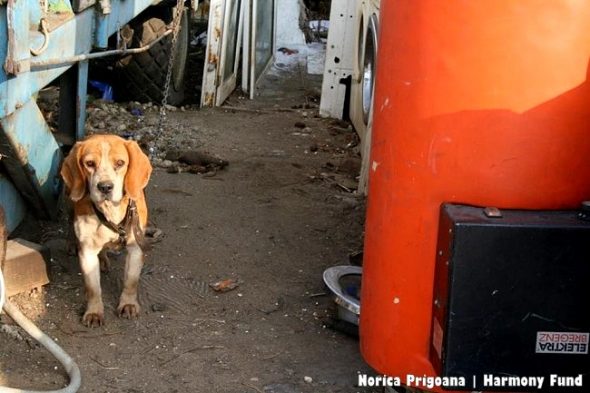No one knows for sure how many stray and abandoned dogs roam the streets of Puerto Rico. Estimates range from 100,000 to 250,000 or more. They are often left to die, unless they're picked up by a kindly tourist or a rescue group.
"They're everywhere. There are beaches and dumping areas where people just go when they have a pregnant __dog or a litter of puppies they want to get rid of," Twig Mowatt, co-founder of All Sato Rescue tells MNN. "People just aren't accustomed to the idea of spay and neuter. It's really bad."
All Sato Rescue works to find homes for the satos — or mixed breed dogs — that have no place to live. Typically that means vetting them and packing them on a plane for the northeastern United States. Most recently, eight puppies and four adult dogs made the trek to the Animal Refuge League of Greater Portland in Maine. It was the first trip funded with help from a grant from the ASPCA and Subaru.
But it's not the first time pups have made a similar voyage. For more than two years, All Sato has been flying dogs about once a week to the Portland shelter and other shelters throughout the Northeast. Last year alone, the group found homes for 2,500 Puerto Rican dogs.
"In New England people are very, very good about spaying and neutering their pets, so there are not a lot of local surrenders at these shelters," Mowatt says. "When people want to do the right thing and they go into a shelter and there's no animal to adopt; that's pretty discouraging."
When the dogs from Puerto Rico arrive, they don't stay long, Mowatt says. "They get adopted immediately. It's shocking," she says. "It's so wonderful."
Not only that, but they drive traffic to the shelters and increase interest in any dogs that might otherwise have been overlooked.
Where the dogs come from
 These shar-pei mixes were sent from Puerto Rico to Sterling Animal Shelter in Massachusetts. (Photo: All Sato Rescue)
These shar-pei mixes were sent from Puerto Rico to Sterling Animal Shelter in Massachusetts. (Photo: All Sato Rescue)
Because there are so many dogs to choose from, the rescuers at All Sato work with the Humane Society of Puerto Rico and other rescue groups to see which dogs have been languishing for a while. In Puerto Rico, Mowatt says, if people want a dog, they tend to go to breeders and pet stores instead of considering adoption, so it's hard for dogs in shelters to find homes. Sometimes the destination shelters will also request a specific type of dog.
"We try to give preference to dogs that have been waiting a long time or are in an emergency situation and need to be moved," Mowatt says. "A shelter may want all puppies or a range of sizes and weights. It's all a little bit of mix and match."
In Portland, the shelter has been incredibly accommodating, Mowatt says. The shelter has taken older dogs, a three-legged dog, teeny puppies, a 120-pound Great Dane and a __dog that had lost an eye.
Sometimes purebreds or purebred mixes get sent to breed rescue groups that can easily find homes for them.
All dogs are given thorough vet checks and are tested for any behavioral issues before they are sent out for adoption, Mowatt says.
Currently, the group is working with three shelters in Maine, two in New Hampshire, four in Massachusetts and one in New Jersey. They're often shelters that don't have many dogs for potential adopters, especially puppies.
"We rescue a lot of very, very young pups," Mowatt says. "They are totally vulnerable and friendly normal puppies ... tossed out on the streets."
- Profile
- Latest Stories
Mary Jo DiLonardo writes about everything from health to parenting — and anything that helps explain why her dog does what he does.
- Posted 8 hours ago:
Puerto Rico's throwaway puppies head to greener pastures in the Northeast
- Posted 10 hours ago:
What will flea season be like this year?
- Posted 1 day, 9 hours ago:
Don't make homemade sunscreen
- Posted 1 day, 13 hours ago:
Why do some cats like to sit on shoulders?































 How felicitous that the light should create a halo around Norica’s head!
How felicitous that the light should create a halo around Norica’s head!




 Skunk spray is powerful stuff, and humans can often detect from up to a mile away. (Photo: ANURAK PONGPATIMET/Shutterstock)
Skunk spray is powerful stuff, and humans can often detect from up to a mile away. (Photo: ANURAK PONGPATIMET/Shutterstock) If your dog isn't the rugged outdoorsy type, he may not need the lepto vaccine. (Photo: Anna Jurkovska/Shutterstock)
If your dog isn't the rugged outdoorsy type, he may not need the lepto vaccine. (Photo: Anna Jurkovska/Shutterstock) 








